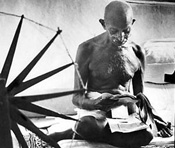 |
As the fifth anniversary of 9/11 approaches, many of the nation's values - tolerance, forgiveness, personal freedom, perhaps even courage itself - remain trapped in the wreckage.
It may take another anniversary, another 9/11 - Sept. 11, 1906, to be precise - simply to remind us of what lies buried beneath the fear and cynicism, the ignorance and politics; and, even more importantly, to wake us up to the urgency of reclaiming those values and healing as a nation.
Led by a president incapable of protecting us but eerily adept at exploiting tragedy, we went off on a howling revenge quest against "the axis of evil" and proceeded to compound the horrors of 9/11 worldwide - turning this day into an excuse for torture and wiretapping and the indiscriminate "shock and awe" bombing of a country that had nothing to do with what had happened.
Around the country, and particularly in New York City, the wakeup call is about to be sounded, as grieving Americans - grieving as much for the future we're bequeathing our children as for the past - proclaim 9/11 a day of healing and peace, not revenge. The memory of Mahatma Gandhi will help drive the message home.
The twist of historical fate juxtaposing the birth of "satyagraha," the world's first large-scale nonviolent resistance movement, with the terror attacks on the World Trade Center and the Pentagon, is downright chilling, like the sound of rhythmic tapping coming from beneath the rubble. Someone's still alive down there! Hope floods the heart.
Liz Graydon, a former middle-school teacher who is now education coordinator for New Yorkers for a Department of Peace, saw mention in a newsletter from Nonviolent Peace Force, which does peace work in Sri Lanka, that this Sept. 11 would be the 100th anniversary of Gandhi's movement for social justice. Not surprisingly, "The date just jumped out at me," she told me. It immediately became the focal point of plans to commemorate 9/11, and the stunning aptness of it has lit up the national peace network.
In August 1906, Mohandas K. Gandhi, a young Indian lawyer living in South Africa, was stunned almost to paralysis - "an impenetrable wall was before me," he later wrote - upon learning about the law the province of Transvaal had just passed, known as The Black Act, requiring Indian nationals to submit to a humiliating registration and fingerprinting process. Its intent was obviously racist, a first step by the white government to marginalize and eventually expel "coloreds" from South Africa.
"I clearly saw that this was a question of life and death," Gandhi wrote. "... the community must not sit with folded hands. Better die than submit to such a law."
Gandhi called a meeting of the Indian community on Sept. 11, which about 3,000 people - Hindus, Muslims and others - attended. One angry speaker, according to Gandhi's account, declared: "If any one came forward to demand a certificate from my wife, I would shoot him on that spot and take the consequences."
Gandhi had another idea: "It will not ... do to be hasty, impatient or angry," he said. "That cannot save us from this onslaught. But God will come to our help, if we calmly think out and carry out in time measures of resistance, presenting a united front and bearing the hardship, which such resistance brings in its train."
Gandhi's vision, which he came to call satyagraha (a combination of Sanskrit words literally meaning "seize the truth"), held the day, indeed, kept the Indians of South Africa unified through eight years of intimidation, abuse and imprisonment. In 1914, the government agreed to end all anti-Indian discrimination. And of course, this movement continued in India itself until 1947, when British colonial rule finally ended.
Graydon, who used the 1982 movie "Gandhi" in her middle school curriculum, said her students were invariably skeptical that nonviolence could accomplish anything. She recalled one boy who conceded, halfway through the film, that it was pretty convincing, "But c'mon, Miss Graydon, there are 6 billion people on the planet. You'll never get all of them to be nonviolent."
She noted that the population of India at the time of Gandhi's movement was 300 million. "We don't need 6 billion Gandhis," she told him. "We need 20 Gandhis."
New Yorkers for a Department of Peace, in conjunction with the M.K. Gandhi Institute for Nonviolence, has organized 32 screenings of "Gandhi" around the country on Sept. 11, including, in New York, at the Regal Theater, across the street from Ground Zero. As far as I can tell, many other events are being planned that day, both in conjunction with and independent of the New York event, that will draw inspiration from this mystical confluence of anniversaries.
"Nonviolence is the greatest force at the disposal of mankind," Gandhi said. "It is mightier than the mightiest weapon of destruction devised by the ingenuity of man."
Maybe the time has come to learn how to use it.
Robert Koehler, an award-winning, Chicago-based journalist, is an editor at Tribune Media Services and nationally syndicated writer. You can reach him at [email protected] or visit his Web site at commonwonders.com